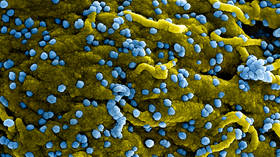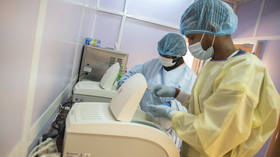WHO declares new virus outbreak

The World Health Organization (WHO) is sounding the alarm over a new virus outbreak after two cases of the Marburg virus disease have been reported in Ghana, marking the first time the deadly Ebola-like virus has been found in the west-African nation and only the second time it has been seen in the region.
In an article published on Sunday, the WHO says that blood samples taken from two people last month in the southern Ashanti region of Ghana suggest that they both had the Marburg virus.
Both of the patients had symptoms such as diarrhea, fever, nausea and vomiting, and died within a day of being admitted to hospital in late June. One of the patients was 26 years old, the other 51.
Now, more than 90 contacts of the two patients have been identified and are being monitored by both the WHO and regional health authorities. The global health agency says it is also assisting Ghana by providing protective equipment, bolstering disease surveillance, testing, tracing contacts and increasing public awareness of the risks and dangers of the disease.
“Health authorities have responded swiftly, getting a head start preparing for a possible outbreak. This is good because without immediate and decisive action, Marburg can easily get out of hand. WHO is on the ground supporting health authorities and now that the outbreak is declared, we are marshaling more resources for the response,” said Dr Matshidiso Moeti, WHO Regional Director for Africa.
The Marburg virus is described by the WHO as a highly infectious viral haemorrhagic fever similar to the well-known Ebola virus disease. The disease can be transmitted to people from infected animals such as fruit bats and spreads among humans through direct contact with the bodily fluids of infected people, surfaces and materials.
The onset of the illness is said to be sudden, with high fever, severe headache and malaise. It’s also noted that many patients develop severe internal or external bleeding within seven days of being infected.
“The public is therefore advised to avoid caves inhabited by bat colonies and to cook all meat products thoroughly before consumption,” Ghanaian health authorities advised.
While case fatality rates have varied from 24% to 88% in past outbreaks, depending on the strain of the virus, there are still no approved vaccine or antiviral treatments for the disease. Doctors may only use supportive care such as rehydration with oral or intravenous fluids and treatment of specific symptoms to improve survival of patients.
The first outbreak of the Marburg virus ever reported was in Germany in 1967. Since then, outbreaks and sporadic cases of the disease have been reported in Angola, Democratic Republic of the Congo, Kenya, South Africa and Uganda, according to the WHO.
The deadliest outbreak so far has been in Angola in 2005, where over 200 people died from the disease.













